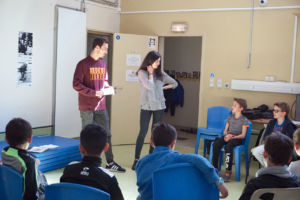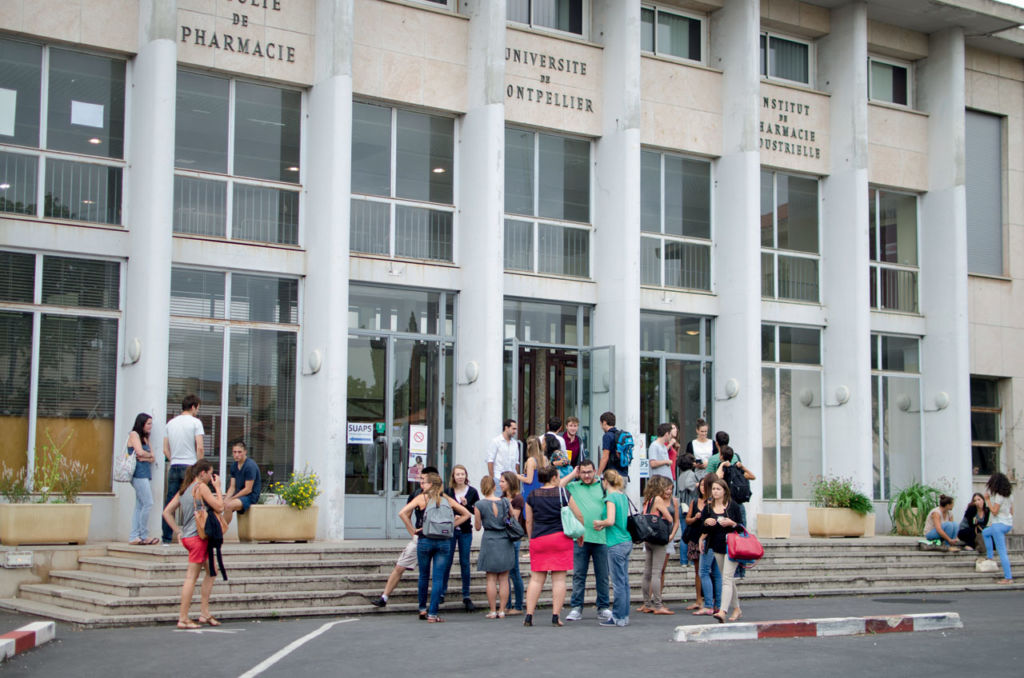The Faculty of Pharmacy is trialing the health service
Compulsory health service for health students came into effect at the start of the 2018 academic year. At UM, this scheme to promote primary prevention* among priority groups concerns students in the fields of medicine, pharmacy, midwifery, and dentistry. An overview of its implementation at the Faculty of Pharmacy.
"When young people talk to other young people, trust and dialogue are more easily established. The same should be true when it comes to preventing health risks," explains Laurence Vian, who is convinced of the educational value of the health service. Since September, the dean of the Faculty of Pharmacy and professor of toxicology has been overseeing the implementation of this complex system within the department. "The health service came into effect almost immediately after its creation, without any associated resources. The faculty's teachers are committed to making its implementation a success. Nevertheless, questions remain, such as compensation for students who will travel to the region to spread a message of prevention for three days in 2019 and then for three weeks in subsequent years, " she recently confided.
Primary prevention
To address inequalities in access to health information, the 90 fifth-year pharmacy students will work with communities that are distant from the university and most vulnerable—particularly young people—to prevent health risks. "Faced with the health problems presented by their patients at their counters in the future, future pharmacists will need to convey primary prevention messages. They will need to simplify their knowledge to ensure that their messages are understood by all audiences," explains Laurence Vian, who sees the health service as an excellent methodological exercise.
Concrete actions
"Our fifth-year students have the necessary background to carry out simple addiction prevention activities. Equipped with fun and educational kits, they benefited from the pedagogical advice of teachers from the Faculty of Education, who trained them over a short period of time to acquire an educational approach," explains the dean of the faculty. For the first year of the health service's deployment, students from the Faculty of Pharmacy will spend two or three days working with classes from first to twelfth grade in schools in the Gard, Aude, and Hérault departments. Their mandatory sessions will last 45 minutes and will be conducted in pairs in split classes of no more than 12 students in the presence of the school's health representative. These are optimal conditions for addressing a major health issue: protecting children, adolescents, and young adults from the risk of addiction and its devastating effects, as they continue to be the primary victims among the French population in 2019.

Fun and educational kits on addiction were provided to students (question-and-answer cards, board games) to help them carry out their primary prevention activities.
* Primary prevention includes measures designed to reduce the incidence of a disease, reduce the number of new cases, or delay the onset of the first symptoms.
The health service as seen by...
Hélène Fenet, professor of public health, responsible for the administrative and educational organization of the health service
 "The health service is a great opportunity for pharmacy students to develop their health education skills for more appropriate primary prevention. This project was developed in consultation with the Regional Health Agency and the local education authority, which identified the topics to be developed in schools. Our students carried out activities related to their university studies, including in the areas of addiction (tobacco, alcohol, hard drugs, screen time, and cyber addiction) and nutrition."
"The health service is a great opportunity for pharmacy students to develop their health education skills for more appropriate primary prevention. This project was developed in consultation with the Regional Health Agency and the local education authority, which identified the topics to be developed in schools. Our students carried out activities related to their university studies, including in the areas of addiction (tobacco, alcohol, hard drugs, screen time, and cyber addiction) and nutrition."
Hajar Hadjseyd, fifth-year pharmacy student
Assigned to Gaston Darboux High School in Nîmes to perform my health service, I will be working to raise awareness among 10th, 11th, and 12th grade students about the risks of screen addiction. I will start by asking them what addiction means to them, so that I can build on that and provide them with essential educational information about the real and little-known risks of regular and prolonged use of various screens."
The faculty in figures
- 2,971 students
- 356 master's students
- 110 undergraduate students
- 756 students in PACES
- 100 students in hearing aid technology
- 72 students studying oenology
Provide training on flu vaccination
To improve vaccination coverage and reduce the number of annual deaths from seasonal flu, the Occitanie region was chosen in 2018 as a pilot region for trialing flu vaccination by community pharmacists. At the end of the summer, the Faculty of Pharmacy set up a continuing education course on "flu vaccination," at the initiative of professors Jacqueline Azay-Milhau, Agnès Muller, and Gilberte Marti-Mestres.
Aimed at licensed and assistant pharmacists, this one-day training course was delivered by faculty teachers in partnership with doctors and nurses fromthe Bouisson-Bertrand Institute. Fifth-year pharmacy students also benefit from this training as part of their curriculum, with the support of the Regional Health Agency and the Order of Pharmacists. The success of this experiment should lead to the extension of flu vaccination in pharmacies to the rest of France in the coming months.
